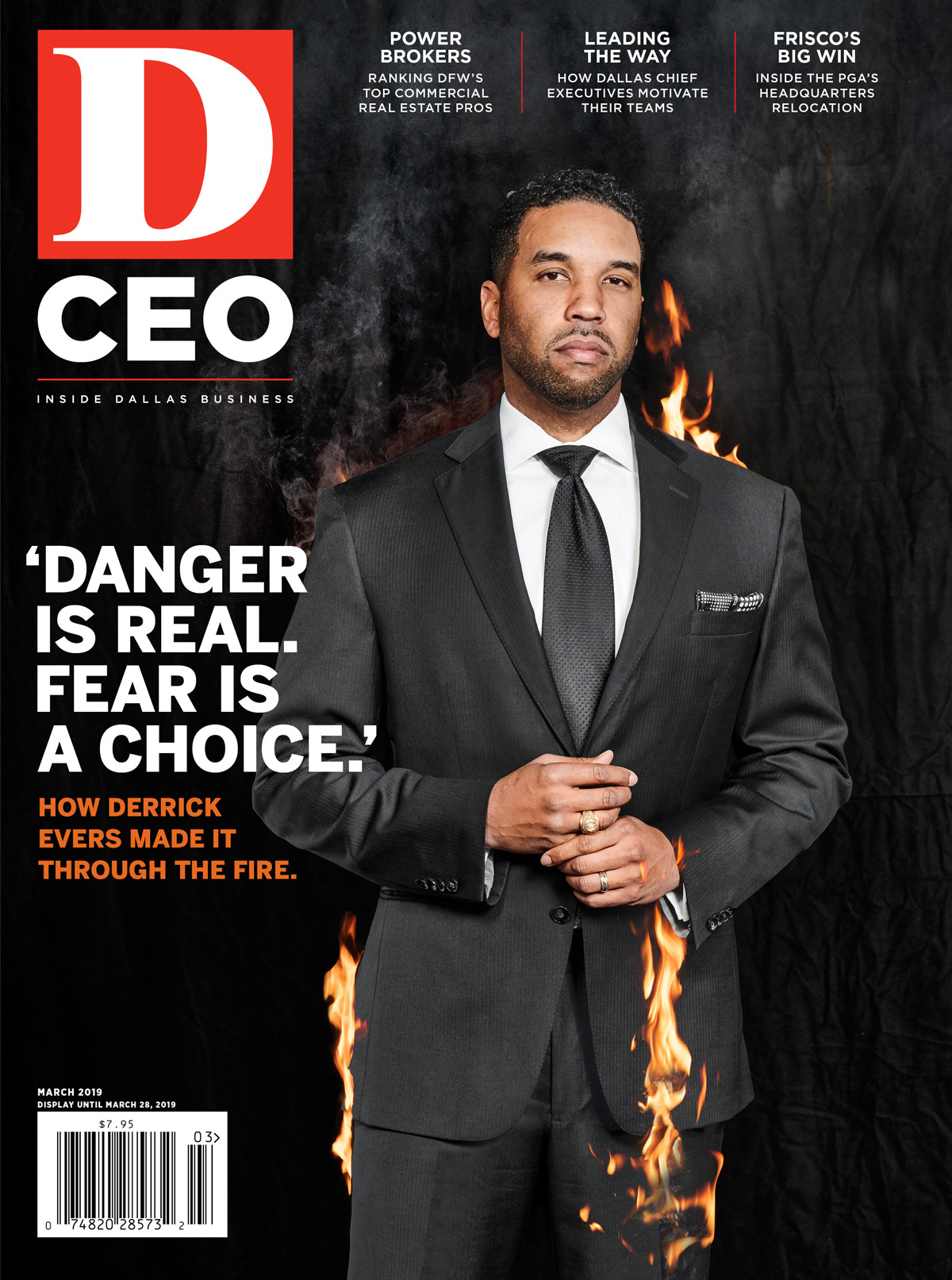The year 2022 is looming large for North Texas’ financial services firms. That’s when more than 55 percent of the workforce will comprise adults born after 1979—a group that is radically different than any previous generation, according to the American Bankers Association, a Washington, D.C.-based trade group.
Millennials (those born between 1980 and 1999) and Generation Z (born 2000 through 2015) are the first generations to primarily communicate with others digitally. They earn wages that are about 20 percent lower than what young adults made 30 years ago, which has caused them to postpone home-buying, parenthood, and other milestones that historically have been major revenue sources for the financial services industry.
“Millennials struggle with the transition from savings to investing and making money work for long-term goals,” says Kelly Lannan, director of young investors at Fidelity Investments, an East Coast-based giant that employs 5,400 people in Westlake. “That difficult transition is what sets us apart from previous generations where life stages were mapped out for you.”
If that weren’t enough for the banking industry, there are early signs that Gen Z’s view of money resembles the conservative approach of those born around the Great Depression and World War II, the so-called Silent Generation. Although their youth makes measuring them difficult, they appear more open to education that avoids big student-loan bills, such as community colleges, Lannan says. On average, millennials owe about $29,000 in student loans, according to the ABA. One metric in particular shows the challenge its members face: 71 percent of millennials “would rather go to the dentist than listen to what banks are saying,” the trade group reports. On some fronts it’s hard to know what millennials want, making it difficult for financial services companies to prepare to serve them down the road.
“Right now they’re not interested in owning things like homes or cars,” says Bob McDonald, a marketing professor at Texas Tech’s Rawls College of Business. Millennials are instead using services such as Uber to experiment with sharing big-ticket items like vehicles, he notes. “As they get older, there will be some who want to have families,” McDonald says. “But I don’t know if demand will be at the same level. It will be a major cultural change.”
Bank of the West, a lender based in Grapevine, has several programs for first-home buying and government acceptance aimed at young adults, according to Cynthia Blankenship, corporate president and vice chairman. “We recognize that millennials are having a harder time buying a home with student debt,” she says. “We want to help as much as possible and make that dream a reality.”
The institution, with $497.2 million in assets, is converting teller counters in its branches into pods of desks, a move aimed at making its locations feel more welcoming to younger customers. It has also installed automatic tellers in its lobbies and uses currency-counting technology to give employees more time for building relationships. “Our millennial customers want faster service with current technology for easy-to-use banking,” Blankenship says.
Experiment. Revise. Repeat.
As with every other part of financial institutions’ businesses, continuous experimentation at the branch level is vital, says David Peterson, chief strategic officer at i7strategies, a Georgia-based consultancy. “Banks are the kings of data and information, but have been woefully lacking in delivering wisdom,” he says. He favors having branch workers do consultative selling, education, and problem-solving for young clients. “Throw in some other elements, such as a 3D printer and virtual reality discovery center, and financial firms’ lobbies would start to become a very popular place.”
But executives must remember that millennials and Gen Z have zero tolerance for less-than-ideal technology, Peterson adds. “Unlike older generations, they will not adapt,” he says. “They will expect the world to adapt to them.”
A Rapidly Changing Market
For upscale institutions like Dallas Capital Bank, the challenge is even more difficult. “We must embrace technology that is both convenient and useful for our customers, but not rely on it so heavily that the human side of banking gets lost,” says Doug Hutt, chairman and CEO.
The bank is a relative newcomer, formed after an investor group led by billionaire Darwin Deason bought and revamped the old Town North Bank in September 2014. Fewer than five years later, its executives are witnessing an evolution of the market. “As the Dallas business landscape grows and changes, we are seeing younger entrepreneurs, business owners, and executives,” Hutt says.
Another challenge for the banking industry is how to forge relationships with young people—the foundation of turning them into customers. “Back when I was 7, my father took me into our bank to open a savings account,” says McDonald, a self-described 64-year-old baby boomer. “That’s the tried-and-true method—reach them early, provide high quality service and hope for long-term customer loyalty.”
Fidelity has found young adults prefer digital advisors, even if they are automated chatbots. “It protects them from feeling dumb or stupid,” Lannan says. “With previous generations, they will call if they need help.”
Baby boomers and Generation X are more apt to use Fidelity’s website, where millennials and Generation Z prefer mobile apps, she adds. “A lot of millennials enjoy communicating with us on social media, such as Twitter chats. We are marketing on Instagram and Snapchat, where we haven’t normally gone in the past.”
Youngsters chat on Snap and consider Facebook passé. Generation Z, in particular, aspire to earn money as YouTube stars. Millennials can also be a puzzle for employers in financial services. “They prefer texting and video chat, which can be challenging because we thrive off face-to-face interactions,” says Blankenship.
Aside from desiring to work with top-notch technology, young employees value personal time and independence. “We also know they prefer a more relaxed work environment, which we like to supply as much as we can,” Blankenship says.
Members of Gen Z are especially open to the flexibility of part-time gigs, and may not yet have access to retirement accounts, creating an opportunity for investment shops like Fidelity to educate them. To help monitor the pulse of this emerging group, Fidelity runs a career-discovery program for thousands of high school and undergraduate women. In October, the firm hosted a one-day gathering in Westlake that gave young women a glimpse of what it’s like to work in financial services. It’s part of a series of events that Fidelity runs across the country. Only 8 percent of high school girls are considering careers in financial services, the company says.
Customized Products
One of the biggest changes across financial services will be the need to tailor products and services to the needs of particular generations of customers. Banks may especially feel pressure to do this from financial technology startups, which are attacking lucrative fees banks charge for everything from transferring money (such as CurrencyFair) to lending it (SoFi). Players as diverse as mobile-phone giant T-Mobile are reportedly offering checking accounts so they can gather data on how money flows in and out of customers’ hands. Regulators are even offering those special-purpose bank charters, the rough equivalent of drivers’ licenses to operate banks.
The lesson is clear for existing banks, according to Peterson: Find unique ways to help millennials run their finances better, or someone else will. For instance, they could offer apps that would project what customers’ balances would be in a few days following big purchases such as 60-inch TV screens. That could also come from the bank knowing what recurring transactions tend to happen at given times of a month.
“Younger generations will not grow up to be their baby boomer or Gen X parents,” Peterson says. “They will evaluate their user experience with financial institutions across all their other online experiences.”
Jeff Bounds is a freelance business writer in Garland.






